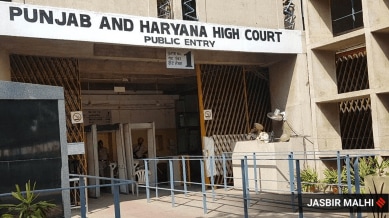80-year-old Haryana widow fights 51 years for family pension, high court slams ‘administrative apathy’
Punjab and Haryana High Court directs the state electricity department to personally verify and release all dues to Laxmi Devi within two months.

In a strongly worded order, the Punjab and Haryana High Court Friday came to the rescue of an 80-year-old illiterate widow who has been running from pillar to post since 1974 for the family pension and retirement benefits of her husband, a lineman who died in harness.
Laxmi Devi’s husband, Maha Singh, died on January 5, 1974, while working as a Sub-Station Officer with the then Haryana State Electricity Board. Though she received a small ex gratia payment of Rs 6,026 in the 1970s, the family pension, gratuity and other dues were never released despite decades of correspondence and an earlier court case in 2005.
Justice Harpreet Singh Brar, while hearing the writ petition on November 14, described the case as “a saga of administrative apathy and a persistent struggle for rightful dues” that revealed “a disheartening and distressing picture of administrative apathy compounded by the petitioner’s advanced age, deteriorating health, and lack of effective legal assistance.”
Commenting on the 51-year ordeal and administrative failure, Justice Brar said, “The petitioner, an illiterate and destitute widow, has been compelled to run from pillar to post for nearly five decades and ultimately approach this court in her struggle to secure the grant of family pension and other retiral benefits of her late husband… The case paints a disheartening and distressing picture of administrative apathy compounded by the petitioner’s advanced age, deteriorating health, and lack of effective legal assistance.”
The court noted that departmental letters showed Maha Singh had been allotted a General Provident Fund (GPF) account and deductions were made, which contradicted the state’s latest claim that he was only under the Employees’ Provident Fund (EPF) scheme and not entitled to a regular pension.
Justice Brar observed: “Curiously, all departmental communications annexed with the present writ petition indicate that the petitioner is entitled to the relief claimed. Moreover, it is incomprehensible how the deceased could have been allotted a GPF Account Number if he was not covered under the Board’s GPF/Pension Scheme.”
‘Constitutional imperative’
Invoking constitutional compassion, the judge said: “Extending relief to a voiceless 80-year-old widow and securing her rights is thus not a matter of judicial discretion or benevolence; rather, it is a constitutional imperative anchored in the Preamble and Articles 14, 19, and 21 of the Constitution. Whenever courts fail to protect the weakest, the constitutional promise stands diminished. But when they rise to defend them, the transformative spirit of the Constitution shines in its truest form.”
The court directed the Principal Secretary or the administrative head of the electricity department, Government of Haryana, to personally examine the veracity of Laxmi Devi’s claims within two months and ensure that “all lawful benefits due to the petitioner are released to her forthwith”.
The petition has been disposed of with the hope that the octogenarian widow, now paralysed and living in destitution, will finally receive her long-denied dues.